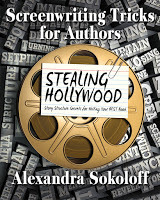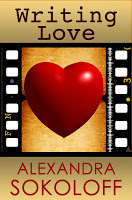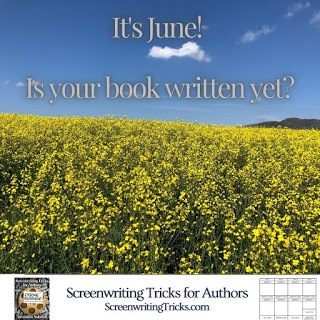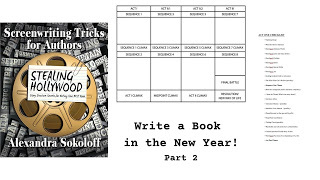Alexandra Sokoloff's Blog - Posts Tagged "how-to-write-a-novel"
Nanowrimo Prep: What is a good story idea?
It's Nanowrimo PREP month!
I always do a brainstorming and story structure review series in October, and continue throughout November with prompts and encouragement, based on my Screenwriting Tricks for Authors workbooks and workshops.
Get free Story Structure extras and movie breakdowns
If you’re going to put a month aside to write 50,000 words, doesn’t it make a little more sense to have worked out the outline, or at least an overall road map, before November 1?
But even before that, it's important to come up with a sustainable IDEA.
When people ask, “Where do you get your ideas?” authors and screenwriters tend to clam up or worse, get sarcastic - because the only real answer to that is, “Where DON’T I get ideas?” or even more to the point, “How do I turn these ideas OFF?”
The thing is, “Where do you get your ideas?” is not the real question these people are asking. The real question is “How do you go from an idea to a coherent story line that holds up – and holds a reader’s interest - for 400 pages of a book or seven seasons of a TV series?”
Or more concisely: “How do you come up with your PREMISES?”
Look, we all have story ideas all the time. Even non-writers, and non-aspiring writers – I truly mean, EVERYONE, has story ideas all the time. Those story ideas are called daydreams, or fantasies, or often “Porn starring me and Benedict Cumberbatch, or me and Idris Elba.” (Or, speaking of Devil's Triangles, maybe both. )
You see what I mean.
We all create stories in our own heads all the time, minimal as some of our plot lines may be.
So I bet you have dozens of ideas, hundreds. A better question is “What’s a good story idea?”
I see two essential ingredients:
A) What idea gets you excited enough to spend a year (or most likely more) of your life completely immersed in it –
and
B) Gets other people excited enough about it to buy it and read it and even maybe possibly make it into a movie or TV series with an amusement park ride spinoff and a Guess clothing line based on the story?
A) is good if you just want to write for yourself.
But B) is essential if you want to be a professional writer.
Let's start with A),
The best advice I ever got about what to write about came from one of my favorite writers, Denise Mina. I heard her say it at the San Francisco Bouchercon in 2010 and it instantly coalesced the idea for my ongoing Huntress Moon series.
Write about what makes you angry.
Now that's a theme for a rage-filled week, isn't it?
It was EXACTLY what I needed to hear at the time. I find rage a great motivator. I get tremendous inspiration from things that make me angry. Social injustice especially. My supernatural thriller Book of Shadows, was partly inspired by the gross miscarriage of justice that resulted in the accusation and conviction of the West Memphis Three in Arkansas: three teenage boys wrongly accused of the murders of three little boys. I am especially outraged by crimes against children and women: rape, abuse, trafficking. Before I sold my first screenplay, I worked in the Los Angeles County prison system, teaching juveniles, mostly teenage gang kids and very young girls who had been arrested mostly for prostitution. Yes, they arrested the girls instead of the men who were trafficking and abusing them. The whole experience taught me a lot about the vicious circle that the so-called justice system is. We are failing our next generation, and it’s heartbreaking. I know I write crime thrillers because of that early experience, and I draw on the emotion of it – and the criminal procedure I learned during that period of my life - all the time. My Huntress/FBI Thrillers - the books and the TV series I'm developing based on the books - constantly draw on my rage about those crimes and my anger at society for not making their elimination a top priority.
Now, I'm a crime writer, so this works particularly well for me. Writing what makes you angry may not work for you. Don't worry, we'll talk about other jumping off points, too.
Now back to writing and calling my senators and reps.
- Alex
=====================================================
All the information on this blog and more, including full story structure breakdowns of various movies, is available in my Screenwriting Tricks for Authors workbooks. e format, just $3.99 and $2.99; print 13.99.
STEALING HOLLYWOOD
This new workbook updates all the text in the first Screenwriting Tricks for Authors ebook with all the many tricks I’ve learned over my last few years of writing and teaching—and doubles the material of the first book, as well as adding six more full story breakdowns.

STEALING HOLLYWOOD ebook $3.99
STEALING HOLLYWOOD US print $13.99
STEALING HOLLYWOOD print, all countries
WRITING LOVE
Writing Love is a shorter version of the workbook, using examples from love stories, romantic suspense, and romantic comedy - available in e formats for just $2.99.
 - Smashwords (includes online viewing and pdf file)
- Smashwords (includes online viewing and pdf file)- Amazon/Kindle
- Barnes & Noble/Nook
- Amazon UK
- Amazon DE
---------------------
You can also sign up to get free movie breakdowns here:
Get free Story Structure extras and movie breakdowns
<!-- /*
It's June! Is your book written yet?
Happy first official day of summer! (I say this so often, but I'm saying it again. How did it get to be June?)
June 1, 2021—and I just finished another, nearly final! draft of Book 1 of my new Golden Gate series.

Always a bit of a miracle, finishing a book. And this one is pretty epic. I should definitely be out celebrating. But it's a miracle I've come to expect, because I've made it happen often enough that there's no reason NOT to believe I'll do it again, and again, and again.
That's lucky, I know. A lot of people would love to write books, but never get there.
As an author, I tend to think, Well, not everyone's cut out to be a writer. Sometimes I even think, Why would you be a writer if you could do anything else?
It's such a weird thing to do! It's not that easy to sit in a chair (or in bed!) for eight or ten hours a day and give your whole consciousness over to a story. It's both numbingly static and a constant, relentless expenditure of energy. And it takes such a long, long time.
But there is nothing more satisfying as finishing. Bringing your characters and their world to life not only for yourself, but for anyone who picks up the book. It's just magical.
And as a writing teacher, it always gnaws at me. What keeps people who have perfectly great ideas from getting to a finished, published book? And the lifelong career that hopefully comes after that?
I meet so many people who I would have thought were a slam dunk for publication, and year after year I hear from them or about them one way or another and—still no book.So I'm asking. Is your book written yet?
Why not?
Seriously. Why not?
Most spiritual teachers I know would say— You know why. You always know.
So name it.
- Is time? The kids? Your spouse? Your job? Your health? Are you not even writing 15 minutes a day, or even 5?
- Is it fear? Do you not want to find out that you can't do this thing that you so want to do?
- Are you stuck? Do you have half a book, a quarter, or even a full draft—but have no idea where to go next?
- Or have you already written a book, or several, that you know are not good enough? Are you worried you'll spend six long months pouring your heart into another book, only to find once again that you can't sell it?
- Are you thinking that you'll have to learn this whole scary self-publishing thing on top of having to write the book to begin with and it's just too exhausting for words?
I really am asking, because I really think you should ask yourself. If your book isn't written, why not?
Asking the question is always the first step to fixing it.
- Alex

Need help? Online workshop now open!
Nanowrimo Now What?
So now what?
First of all, I hope you’ve had a good long break. If at all possible, when you’ve finished a first draft - Take a break. As long a break as possible.
You should keep to a writing schedule, start brainstorming the next project, maybe do some random collaging to see what images come up that might lead to something fantastic - but if you have a completed draft, then what you need most of all is SPACE from it. You are going to need fresh eyes to do the read-through that is going to take you to the next level, and the only way for you to get those fresh eyes is to leave the story alone for a while.
And if you’re here in this New Year and you still haven’t gotten through to “The End” then my advice is always - Keep going. You must get through to The End, no matter how rough it is (rough meaning the process AND the pages…). You can slow down your schedule, set a lower per-day word or page count, but do not stop. Write every day, or every other day if that’s your schedule, but get the sucker done.
You may end up throwing away most of what you write, but it is a really, really, really bad idea not to get all the way through a story. That is how most books, scripts and probably most all other things in life worth doing are abandoned.
But once you have bashed through to the end of your opus, and have that dreaded first draft done…
Ah, now comes the fun part. At least, I think so! No matter how hard the subsequent drafts may be, nothing is ever as hard as that sucky first draft.
But whoever said “Writing is rewriting” was oh-so-right.
While I almost never print out anything anymore, I still recommend printing out your book or script to do your read through.
Don’t get hung up on trying to rewrite. In your first read you are reading all the way through to get a sense of the book overall. You might want to do it in 50-100 page sessions at a time— it’s useful to read through one Act at a time so you can absorb each Act before you move on to the next reading session and the next Act.
Have a pencil or pen to scribble a quick note or slash out something that very obviously isn’t working, but then put the pencil down and keep reading. Again, you’re not rewriting yet, you’re getting a sense of your book.
And this is key: What you wrote is NOT what you thought you were going to write. It never is! So you need to see what you actually did write. And then approach the story that you have, as your own editor.
Once you’ve done your read through, I suggest you sit in a quiet and comfortable place for several hours and make all the notes you can without looking at your pages at all. Just download all your impressions of the book. Make sure you’re making notes on all the good stuff as well as bad! This step might take several sessions, and it’s worth it.
To help you launch into the rewriting process, here are some next steps that can be taken in whatever order is useful to you.
Top Ten Things I Know About Editing
1. Cut, cut, cut.
When you first start writing, you are reluctant to cut anything. Believe me, I remember. But the truth is, beginning writers very, very, VERY often duplicate scenes, and characters, too. And dialogue, oh man, do inexperienced writers duplicate dialogue! The same things happen over and over again, are said over and over again. It will be less painful for you to cut if you learn to look for and start to recognize when you’re duplicating scenes, actions, characters and dialogue. Those are the obvious places to cut and combine.
Some very wise writer (unfortunately I have no idea who) said, “If it occurs to you to cut, do so.” This seems harsh and scary, I know. Often I’ll flag something in a manuscript as “Could cut” and leave it in my draft for several passes until I finally bite the bullet and get rid of it. So, you know, that’s fine. Allow yourself to CONSIDER cutting something, first. No commitment! But once you’ve considered cutting, you almost always will. It's okay if you bitch about it all the way to the trash file, too - I always do.
2. Figure out your SETPIECES, and start to shape those.
This is such a hugely important part of rewriting that I’m going to do a dedicated post about it this week. But as you’re looking to cut and combine, you’re also looking for those genre-specific, thematic, climactic scenes that will sell your book or film and make it come alive and live on in every reader/audience’s imagination. Stay tuned for more!
3. Find a great critique group.
This is easier said than done, but you NEED a group, or a series of beta readers, who will commit themselves to making your work the best it can be, just as you commit the same to their work. They may not admit it, but most editors and publishing houses expect their authors to find trusted readers and colleagues to give them that initial intensive feedback. Really.
4. Do several passes.
Finish your first draft, no matter how rough it is, and give yourself a break. Then read, cut, polish, put in notes. Repeat. And repeat again. Always give yourself time off between reads if you can. The closer your book is to done, the more uncomfortable the unwieldy sections will seem to you, and you will be more and more okay with getting rid of them. Read on for the specific kinds of passes I recommend doing.
5. Whatever your genre is, do a dedicated pass focusing on Genre.
For a thriller: thrills and suspense. For a mystery: clues and misdirection and suspense. For a comedy: a comedic pass. For a romance: a sex pass. Or “emotional” pass, if you must call it that. For horror… well, you get it.
I write suspense. So after I’ve written that first agonizing bash-through draft of a book or script, and probably a second or third draft just to make it readable, I will at some point do a dedicated pass just to amp up the suspense, and I highly recommend trying it, because it’s amazing how many great ideas you will come up with for suspense scenes (or comic scenes, or romantic scenes) if you are going through your story just focused on how to inject and layer in suspense, or horror, or comedy, or romance. It’s your JOB to deliver the genre you’re writing in. It’s worth a dedicated pass to make sure you’re giving your readers what they’re buying the book for.
6. Know your Three Act Structure.
If something in your story is sagging, it is amazing how quickly you can pull your narrative into line by looking at the scene or sequence you have around page 100 (or whatever page is ¼ way through the book), page 200, (or whatever page is ½ way through the book), page 300 (or whatever page is ¾ through the book) and your Final Battle at the end. Each of those scenes are SETPIECES: they should be huge, pivotal, devastating, game-changing scenes or sequences (even if it’s just emotional devastation). Those four points are the tentpoles of your story.
7. Do a dedicated DESIRE LINE pass in which you ask yourself for every scene: “What does this character WANT? Who is opposing them in this scene? Who WINS in the scene? What will they do now?”
8. Do a dedicated EMOTIONAL pass, in which you ask yourself in every chapter, every scene: What do I want my readers to FEEL in this moment?
9. Do a dedicated SENSORY pass, in which you make sure you’re covering what you want the reader to see, hear, feel, taste, smell, and sense.
10. Read your book aloud. All of it. Cover to cover.
I wouldn’t recommend doing this with a first draft unless you feel it’s very close to the final product, but when you’re further along, the best thing I know to do to edit a book or script is to read it aloud. The whole thing. I know, this takes several days, and you will lose your voice. Get some good cough drops. But there is no better way to find errors — spelling, grammar, continuity, and rhythmic errors. Try it, you’ll be amazed.
And all the way along -
Use the essential elements of story structure to pull your story into dramatic line.
In the Stealing Hollywood workbooks I’ve compiled a extensive checklist of essential story elements, Act by Act (with plenty of examples of each element) that I use both when I’m brainstorming a story with index cards and a story structure grid, and I use the index cards, structure grid, and story elements checklist again when I’m starting to revise, to make sure I’m hitting all of these points. In the online workshop I help writers work through those elements Act by Act. https://screenwriting-tricks-for-auth...
So this is a big, big topic, that will take a lot more posts. Or you can get the books and get started.
 https://screenwriting-tricks-for-auth...
https://screenwriting-tricks-for-auth...Writing Love: Screenwriting Tricks for Authors II
More Screenwriting Tricks for Authors: https://alexandrasokoloff.substack.com
First Chapters
So how do we approach writing—or rewriting one?
(And if you’re writing a script, same advice goes, throughout this post.)
The best advice I can give you here is: Don’t sweat this one on a first draft. Or even maybe on the second.
Seriously.
Despite that scene we’ve all seen in practically any Hollywood movie with a writer character in it, there is no law that says you have to start your book by sitting down at your keyboard, cracking your knuckles, and typing “Chapter One.”
Your opening chapter might be the last thing you end up writing. You may be reading a first of second or third draft and find a chapter halfway through the book that you realize needs to go first.
But that doesn’t mean you shouldn’t be thinking about it, keeping it cooking on the back burner. And maybe you’re down to the wire and need some inspiration.
So here’s an exercise to help.
I’m sure you all have TBR (“to be read”) piles. Around our house these are worse than average, because we’re a two-author household. We both have hundreds of books on our Kindles for our own research and pleasure, but we also get sent tons of physical books to blurb by publishers and friends, and to add to the chaos Craig programs two book festivals and consults on others—so you can only imagine the submissions by panel hopefuls! When I was a full-time screenwriter, I had similar stacks of scripts.
So make use of these treasures!
1. Take 10 books from your TBR pile or shelf that you might feel like reading. Read just the opening chapter of each. Separate them into piles, kind of like with Marie Kondo:
-- Not grabbing me.
-- Interesting, I could go further.
-- Never mind the homework, I’m reading THIS one. Now go away.
2. Make a list of the books in that third pile, and then add first chapters by your own favorite authors that just turn you inside out. Keep listing until you have a Master List of ten books.
There is no question that reading a bunch of — well, anything — in a row gives you a good idea of what to do and not to do in executing that particular thing. But it’s doing the next work that will really get you far.
Read more here
From Screenwriting Tricks for Authors:

Stealing Hollywood: Story Structure Secrets for Writing Your Best Book



